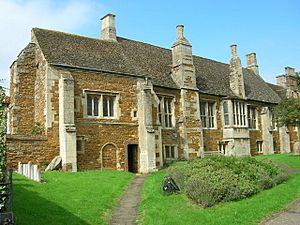Lyddington Bede House facts for kids
Quick facts for kids Lyddington Bishop's Palace and later Lyddington Bedehouse |
|
|---|---|

Lyddington Bede House
|
|
| Location | The Bedehouse is adjacent to the parish church. |
| OS grid reference | SP8758797005 |
| Founded | 12th Century |
| Demolished | Wing of a building, the remainder demolished after 1547 |
| Architectural style(s) | Medieval with later alterations |
| Governing body | English Heritage |
|
Listed Building – Grade I
|
|
| Official name: The Bede House | |
| Designated | 10 November 1955 |
| Reference no. | 1264528 |
| Official name: Lyddington Bedehouse: a medieval bishop's palace and post-medieval almshouse with moat, gardens, fishponds and cultivation remains | |
| Designated | 11-Sep-1947 |
| Reference no. | 1013825 |
|
Listed Building – Grade I
|
|
| Official name: Lyddington Watchtower | |
| Designated | 10-Nov-1955 |
| Reference no. | 1236617 |
| Lua error in Module:Location_map at line 420: attempt to index field 'wikibase' (a nil value). | |
The Lyddington Bede House is a special historic building in the village of Lyddington, Rutland, in England. Today, it is cared for by English Heritage and is open for people to visit.
What you see now is only part of what was once a grand palace for the powerful Bishops of Lincoln. Later, it was turned into a home for poor people, known as an almshouse. The building stands right next to St Andrew's Church.
Contents
A Palace for Bishops
Hundreds of years ago, during the Middle Ages, the area looked after by the Bishop of Lincoln, called a diocese, was the biggest in England. It stretched all the way from the River Thames in the south to the Humber Estuary in the north.
Because the area was so large, the bishop and his staff had to travel a lot. The palace at Lyddington was a perfect stopping point on their long journeys. It gave them a safe and comfortable place to rest.
From Palace to a Home for the Poor
After a period of major religious change in England called the Reformation, the palace was no longer owned by the church. It was given to the rich and powerful Cecil family, who used it as a private home.
Around the year 1600, Thomas Cecil, 1st Earl of Exeter, decided to change the building's purpose. He turned it into an almshouse, or a "bedehouse." This was a home for twelve poor men, who were called bedesmen. In return for their home, the bedesmen would pray for the soul of Thomas Cecil. The building was used as a bedehouse all the way until 1930.
Exploring the Building Today
The Lyddington Bede House is a fascinating place to explore, with many of its old features still visible.
The Great Chamber
One of the most impressive rooms is the Great Chamber, which was used by the bishops for important meetings and meals. If you look up, you can see its amazing ceiling decoration, called a cornice, which has detailed carvings.
The Mysterious Watchtower
In the garden wall, there is a small, two-storey tower known as the "Bishop's Eye." No one is completely sure what it was used for. Its name makes it sound like a watchtower for defence.
However, it was more likely a place for relaxing, like a summerhouse or a gazebo. From here, the bishop could have enjoyed views of his gardens and nearby fishponds, where fish were raised for the palace kitchens.
A Protected Historic Site
The Lyddington Bede House is so important that it is protected in two special ways.
- It is a Grade I listed building, which is the highest level of protection for a building of special historic or architectural interest.
- The whole area, including the house, gardens, and old fishponds, is a Scheduled monument. This means the site is a nationally important archaeological site that is protected by law.
The watchtower is so special that it has its own Grade I listing, and the garden walls are listed as Grade II.
Photo Gallery
|
|
Other Places to Visit Nearby
If you enjoy visiting Lyddington, you might also like these other English Heritage sites:
- Rushton Triangular Lodge
- Kirby Hall
- Eleanor Cross, Geddington
More Palaces of the Lincoln Bishops
The bishops of Lincoln had many other palaces and grand houses across their huge diocese, including:
- Buckden Palace, Huntingdonshire
- Lincoln Medieval Bishop's Palace
- Louth, Lincolnshire
- Nettleham, Lincolnshire
- Thame, Oxfordshire
 | Valerie Thomas |
 | Frederick McKinley Jones |
 | George Edward Alcorn Jr. |
 | Thomas Mensah |









